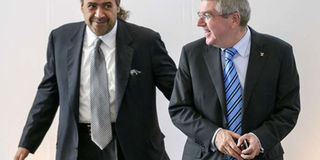High-stakes summit eyes anti-doping overhaul

International Olympic Committee President Thomas Bach (right) speaks with IOC member Kuwaiti Sheikh Ahmad al-Fahad al-Sabah a the opening of an Olympic Summit on reforming the anti-doping system on October 8, 2016 in Lausanne. PHOTO | FABRICE COFFRINI |
What you need to know:
- Some IOC leaders accused Wada of reacting too slowly to evidence that Russia was running a massive state-sponsored doping programme and questioned the agency's governance.
- Wada countered that it has been left dangerously under-resourced.
- Wada, established in 1999, is 50 percent funded by the IOC.
LAUSANNE
Top figures in world sport met Saturday in a bid to overhaul the global fight against doping, as the Olympic movement aims to recover from a damaging crisis triggered by Russian cheating.
Relations between the International Olympic Committee (IOC) and the body it created to promote clean competition, the World Anti-Doping Agency (Wada), hit historic lows ahead of this summer's Rio Games.
Some IOC leaders accused Wada of reacting too slowly to evidence that Russia was running a massive state-sponsored doping programme and questioned the agency's governance.
Wada countered that it has been left dangerously under-resourced.
Saturday's summit is an effort to turn the page and forge "a more robust, more efficient and more independent worldwide anti-doping system," an IOC statement said.
Olympic chief Thomas Bach was huddled behind closed doors on Saturday at a luxury hotel in Lausanne, Switzerland, with some of the most powerful names in international sport, including Fifa's president Gianni Infantino.
"This is my first Olympic summit, so I'll listen before I talk," Infantino told reporters before the meeting.
Wada president Craig Reedie was also on hand, along with Paralympic chief Philip Craven, who got tougher on Russia than Bach by imposing a total ban on Russians from the Rio Paralympic Games rather than the IOC's partial ban.
"Sport has got to come together and I am sure we will," Craven told journalists. "I think that's the intention and during last night's dinner that is what President Bach said."
Bach will hold a conference call with reporters at 2:30 pm (1230 GMT) to discuss the summit's outcome, but the prospects for concrete decisions are uncertain.
WHAT DOES THE IOC WANT?
Currently, anti-doping controls are run by individual sports federations, with Wada overseeing global compliance — essentially trying to ensure that federations follow a broad set of rules.
Bach has said unequivocally that the IOC wants testing to be removed from the federations' hands to do away with a system that is ripe for conflicts of interest.
What that means for Wada's future is not entirely clear.
In October 2015, before the Russia scandal exploded, the IOC floated the idea that global testing could be taken over by an independent body.
It seemed logical to some that a beefed-up Wada could assume responsibility for drug controls across all sports, but months of acrimony have clouded the situation.
Aside from the Russia doping crisis that saw dozens of its competitors banned from Rio, Wada's integrity took a further hit when hackers seemingly intent on exposing perceived double standards leaked Wada medical records of more than 100 top global athletes.
The hack was carried out by a group calling itself "Fancy Bears", believed to be Russian, and revealed which banned medications major stars were legitimately taking under so-called "therapeutic use exemptions" (TUEs).
WADA's difficulties and its tensions with the IOC fuelled suggestions that a new entity could be created to oversee testing.
Asked earlier this week about the expectations for Saturday's talks, Bach told AFP that the IOC "will make some constructive proposals".
Bach has also backed reforms that would see the Court of Arbitration for Sport (Cas) decide on penalties for anyone caught cheating. At present, sanctions are decided by the sports themselves with Cas only hearing appeals.
Bach argues that letting a single court punish dopers in all sports would improve transparency and save money.
WADA CONFIDENT
Wada, established in 1999, is 50 percent funded by the IOC.
But despite simmering tensions with its powerful parent Wada officials have predicted that the agency will remain a strong presence in the intensifying fight for clean sport.
"I do not think that the situation is critical for Wada," its director general Olivier Niggli said last month.
Highlighting the agency's essential role, he stressed that it was Wada that commissioned the bombshell report on Russian doping, unveiling perhaps the largest cheating scandal in Olympic history.
That report, led by Canadian lawyer Richard McLaren, is due to be published in full in the coming weeks.




